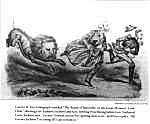Time—1:33
Cathy Barton—vocal; Dave Para—vocal
This traditional ballad presents a Unionist perspective on Gov.
Claiborne Jackson's failed attempt to force the secession of Missouri
from the Union. After Nathaniel Lyon frustrated Jackson's attempt to
seize the U.S. arsenal at St. Louis—the so-called "Camp Jackson Affair"—
during which several civilians were killed and wounded, Gen. William S.
Harney, then commander of the U.S. Army of the West, tried to work out a
"compromise" with State militia commander, Gen. Sterling Price. St.
Louis Unionist Frank Blair, however, believed Harney was collaborating
with Price and Jackson, and had Harney replaced with his own man,
ardently pro-Union General Lyon.
A final futile attempt at compromise took place at the Planter's House
Hotel in St. Louis on June 11, 1861, when Lyon and Blair met Jackson and
Price. Lyon, however, angrily refused to even consider Jackson's
proposal to keep Missouri neutral and have Federal troops leave the
state. The conference ended abruptly with Lyon declaring war. Jackson
and Price then headed for the State Capitol in Jefferson City where
Jackson issued a proclamation calling on 50,000 men to join him to repel
the "invaders" (the "lie" referred to in the third verse in the song).
Jackson decided to make a stand against the Federal troops at
Boonville, but Lyon's close pursuit frustrated his attempt to prepare
for full-scale battle, and the disorganized militia troops retreated
post-haste before the well-armed and disciplined St. Louis Germans,
resulting in the skirmish being referred to as the "Boonville Races."
Although casualties were light, the effects of the encounter were far
reaching. Federal troops forced the State Militia to abandon the
all-important Missouri River, and struck yet another blow to Jackson's
secession attempt.
 There are several versions of this song, the longest in H.M. Belden's
Ballads and Songs, collected in 1916 from T.C. Wright of Tuscumbia, Mo.
This version contains a final verse that attributes authorship of the
song to Miller County resident B.F. Lock. Our shorter version comes
from the Springfield Daily News, Aug. 6, 1951, and is listed as having
been contributed by W.W. Coy. A muddled version of the song, called
“Joe Douglas,” was collected from Spencer Brooks, a black man in
Fayette, Mo., in 1935, by Charles van Ravenswaay and is in his
collection at Western Historical Manuscripts in Columbia, Mo. No
versions have any notations about a tune, but they all have a pattern
similar to that found in the popular traditional song, “The State of
Arkansas,” so that is the tune we used in our rendition. There are several versions of this song, the longest in H.M. Belden's
Ballads and Songs, collected in 1916 from T.C. Wright of Tuscumbia, Mo.
This version contains a final verse that attributes authorship of the
song to Miller County resident B.F. Lock. Our shorter version comes
from the Springfield Daily News, Aug. 6, 1951, and is listed as having
been contributed by W.W. Coy. A muddled version of the song, called
“Joe Douglas,” was collected from Spencer Brooks, a black man in
Fayette, Mo., in 1935, by Charles van Ravenswaay and is in his
collection at Western Historical Manuscripts in Columbia, Mo. No
versions have any notations about a tune, but they all have a pattern
similar to that found in the popular traditional song, “The State of
Arkansas,” so that is the tune we used in our rendition.
|
|
Come all you jolly Union boys, the truth to you Iīll tell,
About old Governor Jackson, of whom you know so well.
He undertook a project and he didnīt quite succeed,
In forcing of Missouri from the Union to secede.
The next step of government, I donīt think it wise.
It was a violation of the Harney Compromise.
If you want to know how he did it, Iīll tell you on the square:
The raising on a large scale, the means of warfare.
Old Claiborne for to show his hand, he swore heīd cut a dash.
He stepped up to the treasury and stole away the cash.
He toddled off to Boonville, in order to cut a swell,
And in his proclamations a lie he did tell.
The Lyon close pursued him, he traveled night and day,
In order to get to Boonville before Claib ran away.
They saw the Lyon coming, with Blair by his side.
And said to one another, “Boys, it's time for us to slide.”
All through old Jacksonīs camp they heard the Lyon roar;
Another such a racket, was never heard before.
They opened up their batteries in order to have some fun,
And the third round that they fired, boys, the Dixie boys run.
|